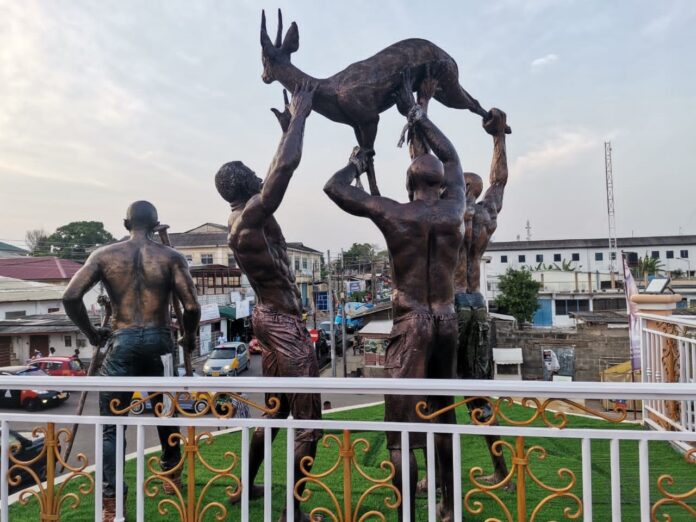
TOURISM is a very broad holistic industry which is composed of and is founded on man-made, natural, cultural and heritage resources. Destinations and tourism industry stakeholders, practitioners and players have never paid equal attention to and promoted balanced development of all four main broad classifications and much more their related sub-sectors, even though cultural and the hospitality sub-sectors have traditionally dominated the tourism industry as the foremost and the second foremost tourism unique selling points (T-USPs) respectively.
Culture literally means the way of life of people; it therefore defines and mirrors society in general. Society’s culture is demonstrated, expressed and reflective by society in chieftaincy, festivals, food, clothing, language, marriage, birth, funeral and burial values, practices, principles, rites and rituals.
Chief and chieftaincy practitioners and the institution holistically are the custodians of society’s cultural heritage and value systems. Traditional leaders and the chieftaincy institution and its practitioners are natural frontline cultural heritage advocates, practitioners, interpreters, administrators, and in effect cultures foremost fountain, unwritten but undisputed brand ambassadors.
The cultural sub-sector and its industries including food, clothing, shelter, occupation and others are rare socio-economic giants which contribute substantially to socio-economic development and transformation and an outstanding socio-economic cash cow for societies around the world, but remain unharnessed and the unsung socio-economic game changer over the years.
Festivals
Festivals are crucial and integral part of culture. They are cultural expressions, values and practices that standout as the unsung cultural cash cow hero in the tourism product-mix over the years. Festivals are unique occasions on which traditional leaders rally their subjects home and abroad to reenact their unique cultural practices, believes, values and practices that are very unique and distinct with a unique community, town, tribe, ethnic group or country at large.
Festivals have their own unique traditional calendar timelines, including the siting of the new moon, harvest season or other distinct natural occurrences among the practicing society or community or fanatics. They are celebrated annually, biannually, quarterly or any other such period that is distinct and recognised by the traditional calendar of the practising faithfuls.
Notable prominent traditional festivals on the Ghanaian traditional calendar that is practised and celebrated by the various ethnic groups, tribes, communities and towns across the country include Aboakyer, Agbamevorzaa, Adae Kese, Agbelizaa, Afaye, Agumatsa, Amu,Atitoezaa, Asafotufiam, Akwasidae, Ayimagonu,Akwambo, Akwantutenten, Alluole, Apoo, Bakatue, Blizaa, Damba, Dezaa, Edina Bronya, Dayibakaka, Elubo,Galizaa, Gbidukor, Glimetoto, Homowo, Hogbetsotsozaa, Kente, Kundum, Kloyo Sikplemi, Kpledjo, Lekoryi, Ngamayem, Tezaa, Ohum and Tortsogbezaa.
Festivals are very important as they signify, mark and above all, are used to re-enact historic events of the celebrating ethnic group, community and/ or society. All festivals all over the world are identified and celebrated with various cultural and traditional rituals and practices which make each festival distinct and unique from each other. These unique and rich cultural practices are unique selling points which attract and dazzle tourists, researchers and general patronage to these festivals.

History
A chunk of festivals the world over are centuries old preserved ancient cultural and heritage events (histories) that occurred in one time or the other including migration, wars, famine, planting, bumper harvest and others that the ancestors and forebearers of celebrating communities and societies have passed on to succeeding generations.
Societies preserve many historic and rare cultural values and practices by succeeding generations that are reenacted during these festivals, to initiate and educate the younger generations about their cultural heritage.
Cultural practices and values, and for that matter festivals are as dynamic as society, many traditional, cultural and heritage festivals have been modernised and transformed into modern fundraising events for self-help and community-initiated development and social projects.
Features
Display, demonstration and exhibition of rare ancestral, cultural heritage, rituals and other ancient protected and preserved cultural practices are major features of heritage festivals which continue to attract and dazzle many patrons, tourists, merry-makers and other cultural stakeholders and enthusiasts.
Unharnessed Ancestral Wealth
Cultural and heritage festivals can effectively and best be branded as neglected, relegated and unsung ancestral wealth, and rare cash cow which have not been properly explored and monetised by succeeding generations over the years.
Omission, packing & promotion
Traditional Leaders are the foremost custodians of our cultural heritage and coincidentally the cultural industry and sector is tourism’s foremost unique selling point (T-USP). Strangely ,however, the framers of the Tourism Act 2011, Act 817, failed, relegated and omitted the cultural sector and the industry from the frontline and soft tourism pull and push factors; it is very crucial and incumbent on the Ministry of Tourism, Arts and Culture (MOTAC), its implementing agencies and strategic partners and stakeholders including the Ghana Tourism Authority (GTA), the National Commission on Culture (NCC), the Creative Arts Agency (CAA) and others to take pragmatic steps to first and foremost correct the glaring omission on the law, let the cultural industry assume its rightful place in the national tourism-mix as well as liaise with traditional authorities to package, brand and promote all the thousand and one cultural and heritage festivals that are celebrated by the diverse ethnic groups and tribes and communities across the country for their unexplored but priceless socio-economic benefits to the Motherland, using both social and traditional media.

Documentation
It is also additionally incumbent on MOTAC and its agencies to collaborate with traditional authorities, the chieftaincy institution and its practitioners and all relevant stakeholders, to mobilise their resources, to document the various and diverse cultural festivals , practices and values for ease of research, education and progress of mankind and society, since a society without history has very bleak future.
Hospitality Outlook
The hospitality sector and industry on the other hand is another tourism sub-sector which covers food and beverages industries.
Hospitality industry is the second most tourism’s unique selling point (T-USP).
Ghana’s hospitality industry is the outstanding lead sector as the largest growth sector which has shaped and positively impacted the country’s fledging infant tourism industry over the years. Certified data and statistics on the state of Ghana’s hospitality outlook made available to the Business and Financial Times tourism desk from the Standards and Quality Assurance (S&QA) Directorate of the Ghana Tourism Authority (GTA) Head office, Accra, revealed that as at the last quarter of 2021, there are 4,076 duly certified ,licensed and accredited hospitality accommodation and catering facilities of various classes and grades and standards , located in the regions across the country, on the country’s hospitality register ,where 5-Star is the foremost grading in the accommodation sub-sector, while grade-3 is the topmost for the food and beverage facilities operating at various locations across the country.
Focus on Abaokyer Festival of Chiefs & People of Simpa & Effutuman
ABOAKYER Festival literally means catching a live deer from the wild. As a festival, Aboakyer is a respected and a rare cultural identity for the chiefs and people of Effutu Traditional Area otherwise known as Effutuman or Simpa (Winneba) – a prominent coastal, ancient and modern cosmopolitan settlement and community in the Central Region.
The Effutus and Effutuman celebrate a very rich and attractive indigenous heritage pastime, an annual cultural festival called the Aboakyer festival. Aboakyer festival is a prominent cultural festival which attracts a lot of cultural and tourism enthusiasts from home and abroad to Effutuman.
History
Oral history has it that ancestral forebearers of Effutuman centuries ago had a fetish war which contributed to their victories during ancient wars with rival tribes, the ancestors therefore instituted Aboakyer, to hunt for a live deer and sacrifice to the god to show appreciation and gratitude to the gods. Aboakyer festival therefore is a sacred ancestral and heritage festival of Effutuman.
The evergreen and colourful cultural heritage festival is celebrated with a number cultural activities and rituals including clean-ups, stool cleansing, reconciliation, arts and artifacts, traditional and modern music and dance, and general fun and merry-making. It is climaxed with an intense and competitive traditional live deer catching competition among native and indigenous asafo companies of Effutuman as the main central theme of the annual cultural and heritage festival.
The Festival is rounded off with pomp and pageantry, and an attractive rich cultural grand durbar by the overlord and people of Effutuman on the first Saturday in May, when rare, well preserved and best of Effutu culture and heritage is displayed is savoured by indigenes and non-indigenes alike.
The Asafo Groups on the eve of the Aboakyer Grand Durbar, perform rare cultural rituals to outdoor their gods. The groups also display their colourful asafo flags and other rituals as attractions of the festival.
Effutuman gears-up for maiden post-covid-19 Aboakyer
Aboakyer as a prominent cultural and heritage festival, like other cultural and heritage festivals are celebrated with cultural rituals and performances including stool cleansing, reconciliation, path clearing and others.
Grand Durbar
The festival is climaxed with a grand durbar on the first Saturday of May, where the Omanhen of Effutuman sits in state to receive homage from both subjects and visitors.
Neenyi Nana Ghartey VII, Paramount Chief of Effutu
Sources close to Neenyi Ghartey V11, the Paramount Chief of Effutuman, have confirmed to Business and Financial Times tourism desk intelligence and scouts team that they are monitoring the preparedness for Simpa and Effutuman to revive Aboakyer at Simpa the traditional and administrative centre of Effutuman.
The relaxing of COVID-19 restrictions by President Nana Akufo Addo has given Aboakyer 2022 a very clean bill of health and the green light; as such Nana Ghartey, his subjects and Effutuman is all but ready to revive and celebrate the prominent cultural and heritage festival with pomp and pageantry.
Nana Ghartey in a message prior to the formal launch of the festival called for peace and circumspection so as not to mar the beauty the sacred cultural heritage.
He called on his subjects to show typical warm hospitality to all visitors to Effutman and further extended warm invitation to all and sundry to Aboakyer 2022.
Aboakyea 2022
Information from the Aboakyer Planning Committee to BFT tourism desk scouts states confidently that: “Aboakyer 2022 as the maiden post-COVID-19 edition will be bigger, better, grand and glamorous after two years hiatus as a result of the coronavirus pandemic scourge and scare”.
Programme
The committee named general clean-up exercises, football matches, Tug of War, Ampe and Aboakyer cooking competition and Food Bazaar, Gospel Musical Night, health walks, as programme of activities that are lined-up to celebrate the maiden post covid-19 Aboakyer.
There will be consecration of ancestral shrine, while Tuafo Number 1 and Dentsefo Number 2 Asafo Companies also will parade deities through the principal streets of Simpa (Winneba).
“Let us unite our energies and rally behind our ancestral common and communal Effutu Flag – a portrait above at Effutu Unity Square seems to tell Effutuman and sundry”
The Writer is Tourism, Brands & Branding, Communication & Marketing Consultant, Practitioner, Analyst, Advocate & Activist









